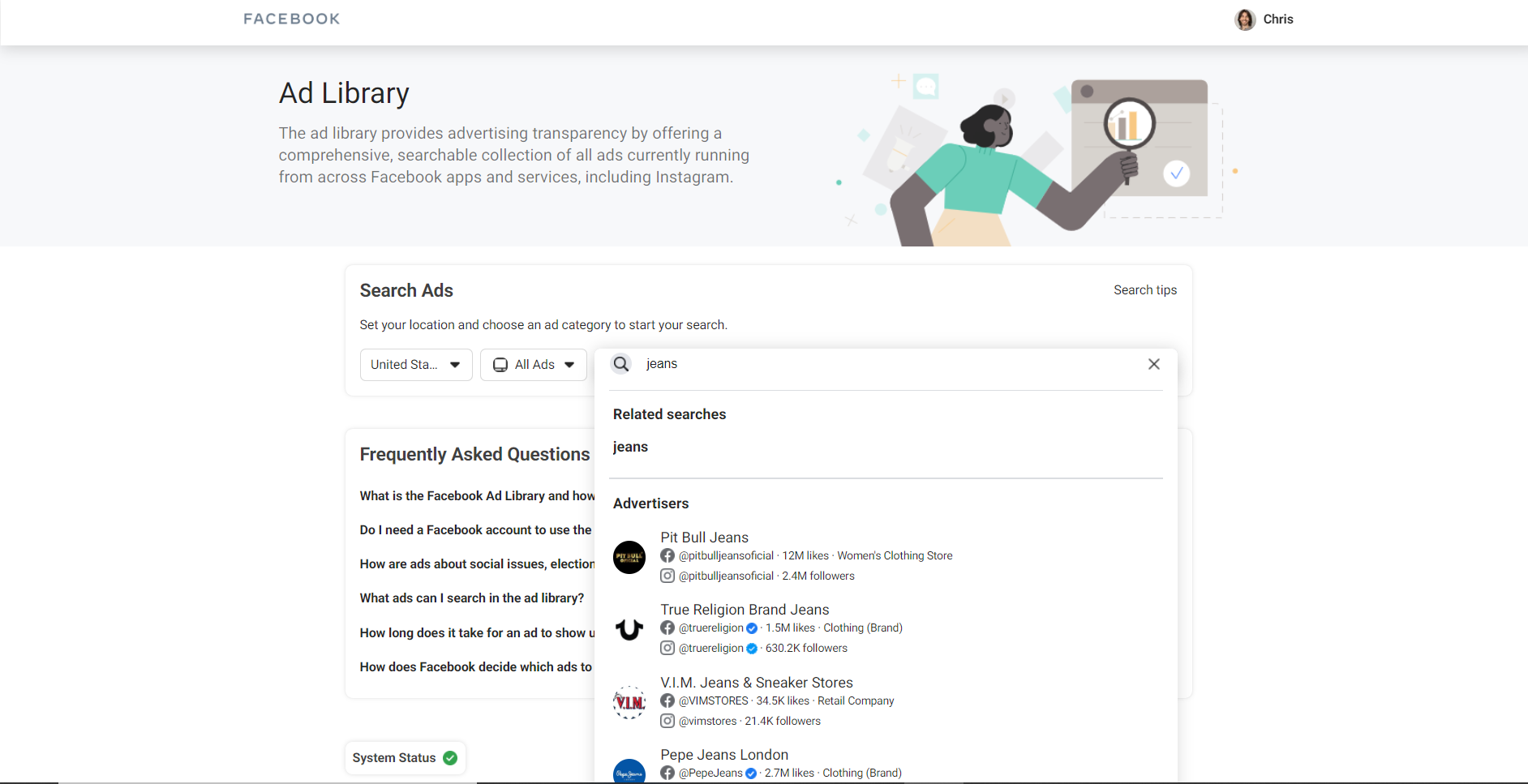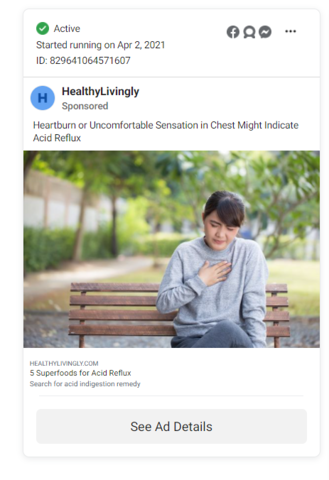As an advertiser, you have a ton of data about your audiences at your fingertips when you run ads on Facebook and Instagram. Did you know you also have a ton of data at your fingertips about your favorite brands and fiercest competitors through Facebook’s Ad Library feature?
The best part is that it’s totally free to use.
In this post, we’re going to talk about 5 clever ways you can leverage the Ad Library to enrich your marketing strategy.
1. Spy On Competitors
The Ad Library on its face appears to be a tool to keep track of political and issue-based spending. While that is one of the things that pushed Facebook to create the tool for transparency, you can actually search any advertiser by name using Facebook’s ad manager.
Spying just got a little easier! 🔎

Just by selecting “Search all” on the drop-down menu and searching for EmberTribe, I was able to pull up ad information on us in a second.

True, you can’t get every little detail about your competitors’ marketing strategy, the research they put behind their ad creative, or the finer points about their budget, ROAS, and impressions. But, you can get ideas! And from these ideas and this new marketing intelligence, you can create hypotheses for new ad campaign tests.
You probably have a pretty good idea of who your biggest competitors are in your niche at this point, right? Using Facebook’s ad library to keep tabs on them could help you get some serious competitive edge, especially by snooping in the comments for some stealthy social listening.
Play around with filters to narrow down:
- Location
- Platform
- Impression by date
2. Get Inspiration for Ad Creative
This is just a natural extension of spying on competitors, in our opinion. If your competitors are worthy competition, there has to be a reason for it. You don't consider them a competitor because they’re bad at what they do! So what do they do well that you can take inspiration from?
After all, we’ve all heard the saying: “Good artists borrow, great artists steal.”
Yes, we are recommending you use Facebook Ad Library to steal (but only ideas!).

If your competition is running particularly stunning ads, why not take to the Ad Library to get inspired?
📸 Can "ugly" images drive good ideas? Actually...yes. →
Type in a competitor and browse their ads. Make notes about what you see as you do a quick audit on their ads strategy, and then apply the same questions to your own ad campaigns.
Some questions to think about during this exercise:
- What images are they using that get you excited about their message?
- Do they follow a theme or particular messaging?
- What kind of feelings are they trying to convey to the audience?
- Are they employing objection busters in their images?
- Do they use videos, gifs, or still images? Do they use a combination of styles?
3. Hone Your Copywriting Skills
Writing is hard! Believe me, we know what it’s like to stare at a sentence (or even just a blank page) for hours.

What do you do when you’ve run out of inspiration for ad copy? How about browsing through the Ad Library for some ideas?
Like the previous suggestion to get ideas for ad creative from competitors, you can do the same for your ad copy by browsing the Facebook Ad Library. You might even find that searching companies outside of your industry give you ideas for writing creative copy that stands out.
Some questions to think about during this exercise:
- Can you dissect the angles they are using in the ad creative? Is it positive, hopeful, playful, negative?
- Does the copy focus on customer benefits?
- Does the copy appeal to a particular audience?
- Is the value proposition clear and effective?
Again, using these questions to guide your browsing will help you strengthen your own copywriting skills for ads.
4. Reverse Engineer A Funnel
This strategy goes beyond looking to touching...or rather, clicking. 🖱️
Chances are you have a finely tuned funnel built out for your own ads. You know that not all ads are created equally with the same purpose and audience in mind, so there’s a lot more information to gather by clicking through a competitor’s ad than just looking at it.
Use the Facebook Ad Library to research how your competition is building their funnels. Try to pull out information that helps you figure out how their funnel is set up, and how it compares to your own.
Consider questions like:
- What landing pages are they using?
- How unique and personalized (or not) are the pages?
- What are they doing well on that page?
- What’s missing?
- Are they providing any discounts or special offers?
5. Search By Product and Keyword
Okay, so maybe you're not getting helpful information about your competitors through Facebook Ad Library for whatever reason. That's no problem at all! You can use the ad library to research ads for particular types of products and keywords.
If you're selling jeans, simply type "jeans" into the search bar to pull up advertisers with "jeans" in their name.

This will give you a random sampling of advertisers and ad creative to add to your swipe file. Score!
If you want to get even more granular with your search, you can use the ad library to do a little keyword research. What keywords have you been targeting in your marketing? Who else is targeting that same keyword? What angles are they using? Do your ads stand out or blend in, in comparison?
For example, if you use regularly use stock images in your ad creative, you might be concerned that your competitors are using the same images.
We have a client that sells a product for acid reflux. After doing a search for "acid reflux" we quickly discovered that another Facebook advertiser also addressing "acid reflux" was using the same stock image for their ads.

The more specific of a keyword you can think of, the better results you'll get in your searches.
Facebook Ad Library: The Big Takeaway
It’s maybe not the most sophisticated tool out there, but having this huge wealth of information about ads that your competitors are running means that there’s a ton of knowledge to be gained!

With the right approach, a marketer can leverage this tool as they work on creating ads that get big returns. Using these four strategies won’t replace the hard work of developing winning campaigns, but it can arm you with a secret weapon full of materials and insights waiting to be found.


-AK-148968-preview.png?width=842&height=310&name=1.01-1x1px-Embertribe-(Client-Services)-AK-148968-preview.png)















.png?width=810&height=810&name=TJ%20Jones%20-%20%20CoFounder%20EmberTribe%20(1).png)


%20-%20500x500%20-%20SP%20-%2045.01.png)
%20-%20500x500%20-%20SP%20-%2049.01.png)
%20-%20500x500%20-%20SP%20-%2057.01.png)


.png)